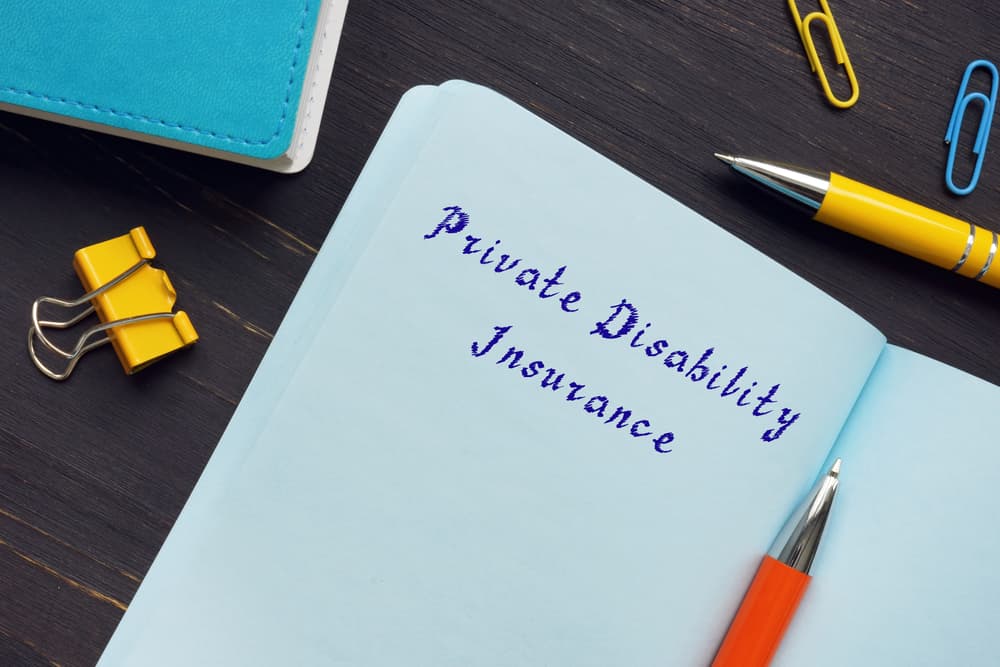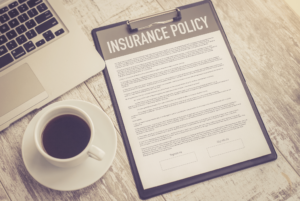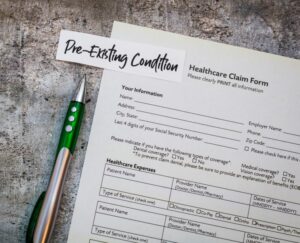
Imagine you are a non-disabled worker, and you have no expectation that you will have to touch your savings because of any medical condition. Unfortunately, statistics show that any worker can suffer an illness or injury that leaves them unable to work. While we do not wish this upon anyone, it can happen to anyone, and it does to millions each year. The goal of disability insurance is to protect a portion of your income while you recover or adjust to your condition.
While many employers offer short and long-term disability benefits, some do not, and getting these benefits can be tedious. Your other option is to rely on your savings and family for support. Fortunately, there is a third option if you do not have employer-sponsored disability coverage – purchase a private individual disability policy.
If you have a private policy and suffer a disability, getting your benefits can be challenging. You must speak to a local disability insurance lawyer when you need to tap into your benefits.
How individual disability plans work
While many employers offer short and long-term disability insurance options, some do not. Instead, you can purchase an individual disability insurance policy. For those who make substantial income, an individual plan provides additional coverage. Another benefit is that the policy moves with you, so you will still have coverage if you get employment elsewhere.
Individual plans are contingent on individual health and characteristics and medical history for the last few years. It will depend on the insurer how far back they will want to go before they determine your eligibility. The best strategy is to get an individual policy before you have anything on your medical history that can hinder you from being eligible for these programs in the future. While that is a great strategy, it is not always feasible.
One downside to individual policies is they do not follow you until retirement like group policies do. Ensure your policy offers the highest number of years possible. Since it is transferable, you can keep the policy as you move from job to job. You can also use individual and group policies together, but you must review both policies to ensure this is feasible.
Contact
For a free legal consultation, call (225) 201-8311
Employer-sponsored disability insurance
While you always have the option to purchase an individual plan, it is usually best to see if your employer has a group policy you can join. The costs and eligibility are different for group versus individual plans. The insurance company will not evaluate you as an individual and will only consider your employment status.
These plans will often work with SSDI benefits, and you can purchase add-ons if available. These plans do not move with you, so your benefits end once you leave the company.
Social Security Disability Insurance
While Social Security is an excellent program in theory, it has its pitfalls. The eligibility requirements are extensive, and anyone employed or self-employed can only participate once they reach a certain threshold. This benefit is unavailable to people who currently have a disability and have no work history; they will have other benefits available.
There are many nuances to these benefits, like your earrings, work history, credits, and future prognosis. You must prove you will be out of work for a minimum of 12 months. Even if you meet all the qualifications, you will still need to wait an extended waiting period before you can receive benefits. While you can attempt to supplement your income through a state or federal social security plan, it will take time, and you need options.
Many employees use their short-term disability benefits, then long-term ones, while they file and get approval for Social Security benefits. One caveat is when you begin to receive Social Security benefits, your long-term disability benefits will be offset by the amount you get from SSDI, depending on the policies and regulations.
Click to contact our insurance claim lawyers today
Short and Long-Term Disability
Short-term and long-term disability insurance work similarly for the most part, minus a few distinctions. The critical difference is when and how long you can access these benefits. The benefit period will vary; as the names suggest, one is shorter, and the other is longer.
Short-term disability covers you for a temporary period and is what you will use initially. Long-term benefits apply to persistent or permanent disabilities, and they might last indefinitely until retirement age. Typically, short-term benefits last until long-term benefits can begin.
Benefit periods range by policy, as does the percentage of your income covered. Long-term disability will begin after you exhaust short-term benefits, and it can last for much longer. If you qualify for long-term disability, there is a shorter span of a couple of years after which your benefit eligibility can change.
The waiting periods to receive benefits also vary per policy and insurer. The elimination period for the short term is days or weeks, while the long term can take months and a year in some cases. To see if you can expedite the process, you can work with a disability lawyer.
Complete a Free Case Evaluation form now
Health insurance
Most people assume that health insurance will cover their expenses when they suffer an injury. While health insurance will cover medical costs, you will still need to pay copays and daily expenses, and it does not cover lost income. These expenses can take you over the edge if you cannot work. You will also need to consider what happens when you suffer from a disability. Health insurance is essential for medical needs, but it only goes so far, and you will need additional protections for you and your family.
Since most health insurance is tied to employment, you can lose eligibility for their health insurance plan when you begin to get long-term disability. You might continue receiving health insurance through COBRA until you qualify for Medicare. However, some short-term disability plans offer you enough insurance to get you to the point where you are eligible for other health insurance plans.
Factors to consider
 Many factors go into the decision of whether to purchase an individual plan. Additionally, the insurance company will consider several things before determining how much you will pay and what provisions they will include. While a group policy will not have as many hurdles, individual policies do. However, when you weigh out the possibilities of what can happen when you do not have insurance, you will likely not want to risk it.
Many factors go into the decision of whether to purchase an individual plan. Additionally, the insurance company will consider several things before determining how much you will pay and what provisions they will include. While a group policy will not have as many hurdles, individual policies do. However, when you weigh out the possibilities of what can happen when you do not have insurance, you will likely not want to risk it.
Hazardous occupations
If you work in a hazardous field like a warehouse with heavy machinery, you will likely need to pay more than someone who works in an office. You also have a higher chance of injury or illness when you have a hazardous workplace. The insurer will consider your occupation when they determine your rate.
Health status
Past and current health conditions can also affect your insurance rate and options. If you have a history of debilitating diseases like asthma, chronic back issues, and more, you will likely have a higher rate as you will need more protection. Since you have a history of suffering from these conditions, you will probably need to use these benefits.
Benefit period
The benefit and the elimination period should be determining factors in making your decision to purchase a policy. Both periods are instrumental to your policy. The elimination period is how long you need to wait before you can access benefits, and you will need to find other resources, like your savings and emergency funds. The benefit period is also essential because that is how long you will receive benefits, and once this period ends, you need to have another source.
Disability definition
Your description of disability will likely be different from Social Security or private disability insurance but what matters is the definition written in the policy. The definition of disability is vital to your claim and benefits because depending on which definition the insurer uses will determine the benefits you can receive. If they use the same definition as Social Security, you can access more benefits than if they use a more generous definition. You should also consider if the policy offers partial benefits, meaning you can work only for 20 hours a week.
Supplemental disability insurance
For additional disability coverage, you can purchase an add-on that is supplemental disability insurance. It will help you protect a large portion of your income, commissions, and bonuses, some employers will purchase group policies that offer this add-on, but you will need to do your research.
How much you need
Since everyone has different needs, you must consider yours when choosing a policy and add-ons.
Most people have no idea where to begin, but here are some costs you should consider and how you will pay for them if you are unexpectedly out of work:
- Food
- Child care
- Housing
- Loan payment
- Auto expenses
- Utilities
- College expenses
- Retirement savings
- Other regular expenses you have
You will also need to consider the time you need the benefits and how long you can survive before benefits begin.
Premiums
Price is an essential factor, but a lot goes into your premium calculations. You need to consider if the policy auto-renews as long as you pay the premium on time and if they consider subsequent medical events. Additionally, will premiums be waived when you use your policy, and is there a reinstatement process when there is a lapse due to a disability?
If you purchase an individual policy, it is to prepare for the future, and part of that is whether you can continue making payments. You should consider any scheduled increases in premiums the insurer has. Lastly, can you increase coverage without going through the underwriting process?
Why you need disability insurance
While you are healthy now, it is not to say you will always be this way. You might not think you will suffer a disability until you suffer a disability; therefore, you need insurance to cover you during that time. Injuries do not always happen at work, and you can suffer a disability while taking a scenic walk. Having disability insurance ensures financial security if an injury or illness keeps you from working for over a year. If you have a family you provide for or other dependents, you need a safeguard should you become unable to work.
How do you get disability insurance?
If you are getting an individual policy, you will need to research and find a company that offers you a plan you are comfortable with. Discuss your options with the insurer and analyze the possible coverage options and costs. You can work with a financial planner to review your financial picture and advise you on what you need to cover any gaps.
Once you know what you need and are comfortable paying, you can purchase a policy from the insurer you choose. Remember, there is an underwriting process, so you will need to wait for a decision about your eligibility.
Emergency funds
If you do not have short or long-term disability options through your employer and do not purchase an individual plan, the only safety net available is your emergency fund. It is challenging to have a savings or emergency fund with mounting bills. While economists suggest you have three months’ worth of savings, that amount is likely grossly insufficient to cover a disability.
Disabilities require extensive time away from work, and you might not return to your previous role for years or at all. Few emergency funds will sufficiently cover all of your expenses. That is not to say you should throw your emergency fund out the window, but you should also look into your disability insurance options.
Speak to a private disability insurance lawyer

Private Disability Insurance Attorney, J. Price McNamara
When you suffer from a disability and need to access benefits, you must speak to a long-term disability lawyer. While you are paying your premium and investing in a safety net, the insurance companies will still make it challenging to access these benefits.
Even if they approve your claim, there are waiting and benefit periods that can affect your financial foundation. Once you get all your benefits, the insurer can offset your award based on other help you are receiving. There are many other considerations; your LTD lawyer can address these and ensure you get the protection you deserve.
Call or text (225) 201-8311 or complete a Free Case Evaluation form




